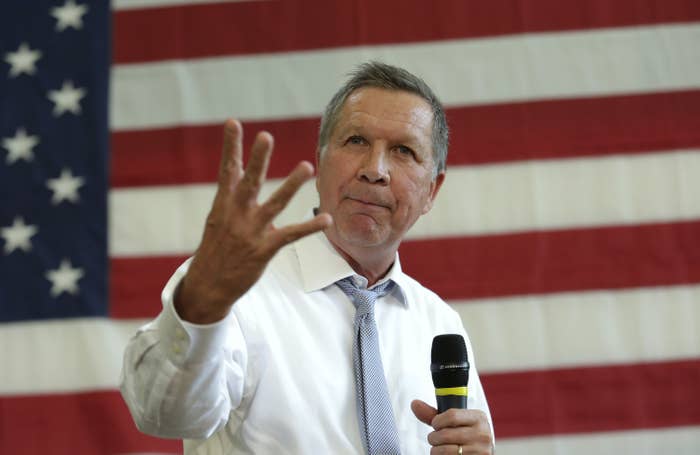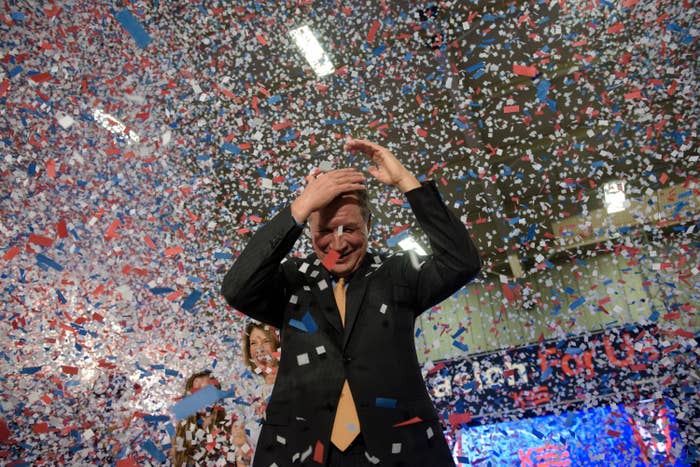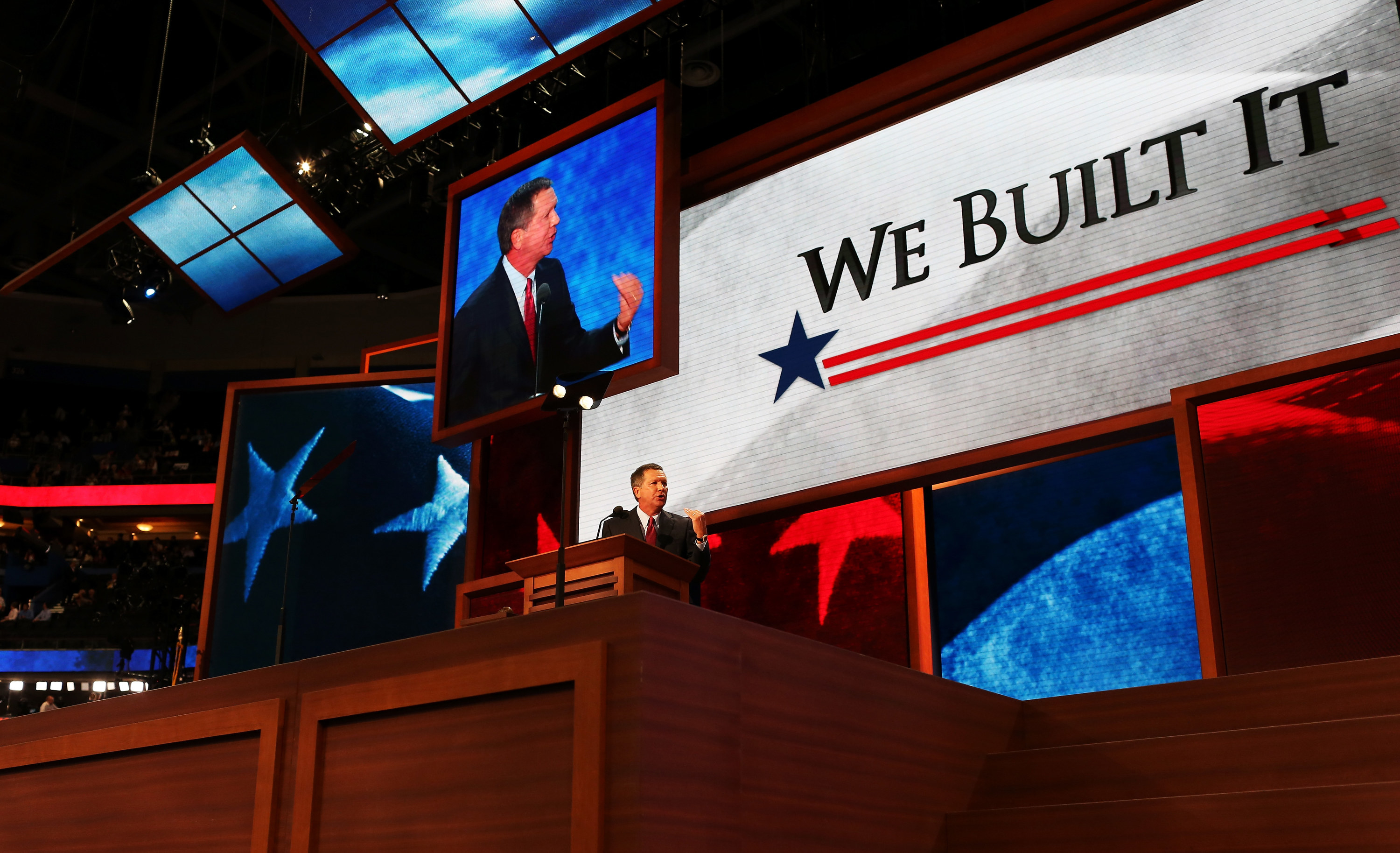
John Kasich spent decades trying to shape and reshape his beloved Republican Party.
Now the former Ohio governor — an unrelenting critic of President Donald Trump — is offering his services to Democrats, who will use them this week to make the case for Joe Biden.
Kasich will be featured in primetime during the opening night of the Democratic National Convention on Monday. When word of his appearance first spread, it wasn’t lost on faithful Democrats that a onetime tea party conservative and Fox News host had scored one of the precious few speaking assignments during an event that has been scaled down heavily for television because of the coronavirus pandemic. "Maybe,” one veteran Democratic operative who has experience in Ohio reacted upon hearing the news, “we shouldn’t have guys who tried to break unions and put gag orders on rape crisis counselors speak at our convention?"
In an interview, Kasich told BuzzFeed News that it was Democrats who approached him to speak — an assertion Biden’s presidential campaign did not dispute.
“This was not something that I instigated,” Kasich said by phone last week. “And when they came and asked, ‘Do you want to do it?’ I had to think about it, right? I had to think about it. And it's not like I'm gonna be turning around. I’m a Republican. But I just think that at this point in time, my Republican affiliation is outweighed by my concern about the direction of the country.”
Kasich’s welcome endorsement and the overall programming of the convention say a lot about Biden’s vision for the Democratic Party he now leads. Viewers may get a minute of Rep. Alexandria Ocasio-Cortez, the young New York lawmaker who excites progressives, but they’ll also hear from John Kerry, an elder of the establishment. And Kasich is sharing a night with Sen. Bernie Sanders — a democratic socialist and the runner-up for this year’s nomination — in a scheduling move intended to demonstrate Biden’s ideology-spanning support.
“I think both parties have to have new ideas, and I think this country is moderate,” said Kasich, winding up to a gentle criticism of Ocasio-Cortez. “People on the extreme, whether they're on the left or on the right, they get outsized publicity that tends to define their party. You know, I listen to people all the time make these statements, and because AOC gets outsized publicity doesn't mean she represents the Democratic Party. She's just a part, just some member of it. And it's on both sides, whether it's the Republicans or whether it's the Democrats.”
Kasich ran for the Republican presidential nomination in 2016 as a pragmatic conservative, the kind of leader who balanced budgets in Congress, expanded Medicaid as governor, and won overwhelmingly Democratic counties during his 2014 reelection campaign. His message was drowned out by Trump’s far-right populism and appeal to tribalism. Biden ran as a pragmatic progressive in this year’s primaries and was criticized for emphasizing his bipartisan sensibilities. His message, though, prevailed.
Many Democrats remember a more right-wing Kasich. He chaired the House Budget Committee during the Gingrich Revolution of the 1990s, and even some of his bipartisan milestones of that era — welfare overhaul, for example — aged poorly. (Biden has experienced a similar dynamic with the crime bills that he championed as a senator.) After he left Congress in 2000, following his first unsuccessful presidential run, Kasich had his own show on Fox News and occasionally filled in for Bill O’Reilly. He worked for Lehman Brothers ahead of the 2008 banking meltdown. And when he ran for governor in Ohio in 2010, he did so as a tea party warrior. His first major act stripped public employees of their collective bargaining power — a measure that voters overturned at the ballot box by a margin embarrassing to Kasich.

Even so, Republicans gave Kasich a primetime slot at their 2012 convention, featuring him along with a crop of other governors who at the time were viewed as the future of the party. After Mitt Romney lost to Barack Obama that year, Kasich was among the Republicans who internalized the concerns that the party had become too mean and too doctrinaire. As he prepared for a reelection bid that he and his close advisers saw as a catapult for a 2016 presidential campaign, he pushed for Medicaid expansion (under the Obama healthcare program he and other Republicans had strenuously opposed) and suggested a fracking tax.
“You know, I have a right to lead, too,” Kasich replied in 2014, when asked about his political shift. “I have a right to shape what conservative philosophy means. You know, I have a right to move forward with programs that I think maybe in the short term may not be that popular but in the long term may yield an awful lot of good. Why not? Why would I not do that?”
Known for being brusque, Kasich branded himself anew as “the prince of light and hope” during the 2016 primaries — as a foil to Trump’s politics of antagonism, fear, and grievance. He lasted longer in the race than most expected, serving to the end as a contrast to what his party was becoming. He refused to appear at Trump’s coronation that summer in Cleveland, even though as governor he had lobbied hard for Ohio to host the convention.
Had most Republicans not so completely and uncompromisingly aligned themselves with Trump, Kasich might have challenged him in 2020. He kept his team intact, wrote books and op-eds, got a CNN gig, and made several trips to New Hampshire, the first primary state. But the party stitched things up early for the incumbent. The Republican National Committee voted to scrap primary debates, and several state parties went as far as canceling their primaries. The few Republicans who did try to challenge Trump earned some media attention but failed to gain any traction. Kasich was left, as he was four years ago, as a man without a party.
“There's no mystery here, but people shouldn't miss, in some respects, what it means,” Kasich said last week about his invitation to be a prominent part of this year’s Democratic convention. “I don't care if people agree or disagree with my speaking there. Whatever. We’ve got to settle things down. We're not in two warring camps, Republicans and Democrats.”
Anger about Kasich’s involvement in the convention persists, though — especially among progressives on social media or pro-Trump conservatives who see it as the latest in a long line of apostasies. A poll released Sunday by CBS found that just 38% of Democrats would like to hear from Kasich at the convention, compared to 63% who said the same of Ocasio-Cortez. You can also count on Kasich’s name being invoked when someone is upset about their favorite Democrats being left off the prime time schedule or with limited speaking time. But party leaders believe Kasich can help reach independents and moderate Republicans.
“I won’t get into the convention speakers lineup,” said David Pepper, the Democratic chair in Ohio, who sidestepped a question about Kasich’s role specifically. “To have a high-profile Republican saying, ‘vote Biden, not Trump’ — I think those voices do matter.”
Sen. Sherrod Brown, another Democrat from Kasich’s state, was more generous. “Kasich is an example of a Republican with some spine,” Brown told BuzzFeed News in a telephone interview. “I hope that other Republicans follow his principled leadership.”
Nancy Patton Mills, the Democratic chair in Pennsylvania, noted Kasich’s upbringing in the Pittsburgh area. (Kasich in 2016 constantly introduced himself as the “son of a mailman,” a tidbit that might have new relevance at a time when Trump is undermining the United States Postal Service during a pandemic election that’s expected to see a surge in mail-in ballots.)
“Hillary Clinton did not perform well in the red counties around Pittsburgh and southwestern Pennsylvania,” Mills said. “So when Kasich says that he is going to support Biden, some people of course don't want any Republicans doing anything, but it's kind of important here because Kasich's from a suburb of Pittsburgh and thousands of people remember him.”

What comes next for Kasich is an open question. He lost control of the Ohio Republican Party in early 2017, his closest allies pushed out of power in favor of operatives willing to disavow the governor and pledge loyalty to Trump. Later that year, Kasich joined Biden for a forum on civility at the University of Delaware. The way Kasich saw it, a mutual respect emerged.
“I mean, there were things we agreed upon, things we didn't agree upon, but it was very, very pleasant,” Kasich recalled. “And so I believe that he's the kind of person that will, you know, he's gonna be able to let other people have a say. I don't think he's gonna just bully people.”
Kasich describes his alliance with Biden and the Democrats as a “team of rivals” — a phrase borrowed from the historian Doris Kearns Goodwin and her book on Abraham Lincoln’s Cabinet. Kasich acknowledged that his convention speech, which he prerecorded from Westerville, Ohio, will raise speculation that he might be in line for a post in Biden’s Cabinet.
“People say, ‘Well, he must have been promised something or he must have received something.’ I haven't been promised anything, nor have I received anything,” he said.
“I'd be more than glad to advise, but I'm not going back to Washington,” Kasich added. “Could you imagine my being Secretary of Commerce? I mean, I wouldn't survive. I'll try to keep my voice out there. And look, you know, we'll just see how it goes. Let's just see how it goes.”
